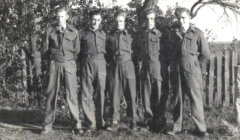Letters / We all need to contribute towards inclusive societies
This week in Alzheimers Awareness week we have been disappointed by an incident we have heard about in a café in Shetland.
An elderly gentleman with dementia was out for a cup of tea with his support worker from one of our valuable third sector organisations within Shetland.
As we do with all our clients, the support worker was encouraging him to do as much as possible for himself. This client usually enjoys a chat with people and is still able to do much for himself – it is not always obvious when someone has a diagnosis of dementia and people’s behaviour can fluctuate at times.
On this occasion, the gentleman had spoken to a lady as he went into the café. He then went to the till with his support worker and ordered his drink, the owner took his order. After they had sat down, the owner came charging over to their table to shout at them in front of everyone for the comment he had made to the lady on the way in. The support worker and elderly man were very upset but quickly ate their food and left.
After he returned home, his family on hearing about the incident, went to the café to ask about what had happened. The café owner did not feel they had done anything wrong and suggested that the man didn’t even have dementia and that, if he did, the carer should have been looking after him properly.
This support worker is fully trained and was encouraging the person to maintain as much of his independence as possible and often this man will engage in conversation with others – usually with no problems. Support workers would not normally point out that the man had dementia as there is no need for everyone to know this.
Become a member of Shetland News
Fortunately, this attitude is not very common in Shetland and generally people include others. Usually, other customers in public places will have no idea if a person is living with dementia or not.
In order to help support venues and clients to be able to use them, Alzheimer Scotland have offered “Dementia Friends” training to many places and Ability Shetland provide Disability Awareness training to support organisations with how they can support customers with disabilities.
There is also an app called “WelcoMe” this helps organisations to deliver excellent customer service to disabled visitors. The customer is able to create a profile about their needs and gives their key requirements and information about the support they require.
There are some schemes such as the ‘sunflower lanyards’ that a person wears to indicate that they have what is called “an invisible disability”, perhaps autism or dementia, or something else that you can’t see. However, not everyone chooses to wear one of these and we have to rely on the public being sensitive and kind.
There are lots of barriers that prevent people living with disabilities from fully engaging in society. These can be physical, like buildings not having accessible toilets or ramps, or they can be caused by people’s attitudes to difference, like assuming disabled people can’t do certain things.
Making some of the changes can be quite expensive but being kind and having a positive and inclusive attitude is free! We all need to contribute towards inclusive societies that we want to live in, after all none of us know if we may get dementia or become disabled in the future and I’m sure we would all want to be treated with respect.
Karen Hannay – Shetland Community Connections
Stephanie Bain – Ability Shetland
Market House, Lerwick
Become a member of Shetland News
Shetland News is asking its readers to consider paying for membership to get additional perks:
- Removal of third-party ads;
- Bookmark posts to read later;
- Exclusive curated weekly newsletter;
- Hide membership messages;
- Comments open for discussion.
If you appreciate what we do and feel strongly about impartial local journalism, then please become a member of Shetland News by either making a single payment, or setting up a monthly, quarterly or yearly subscription.












































































